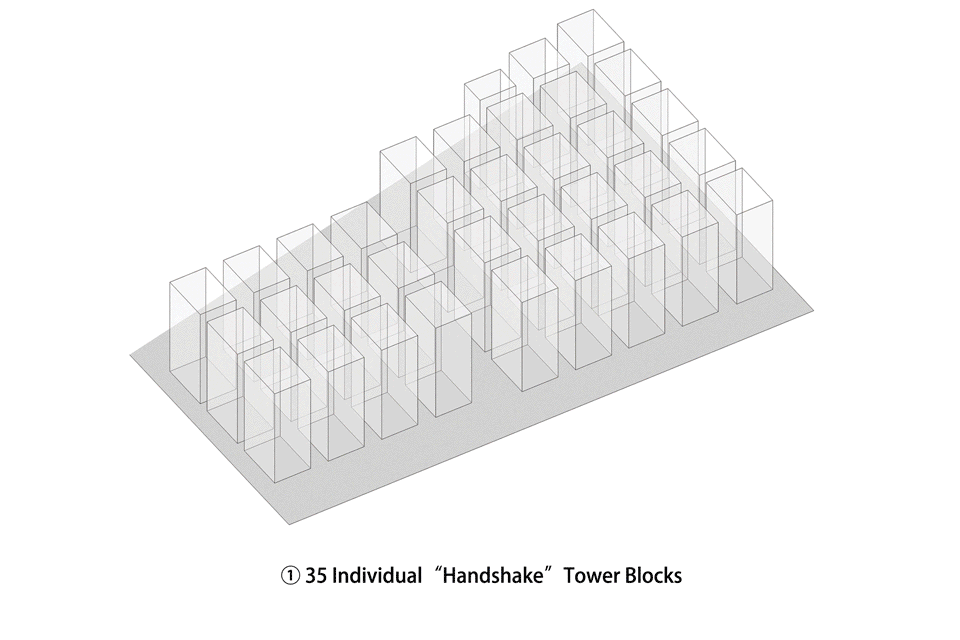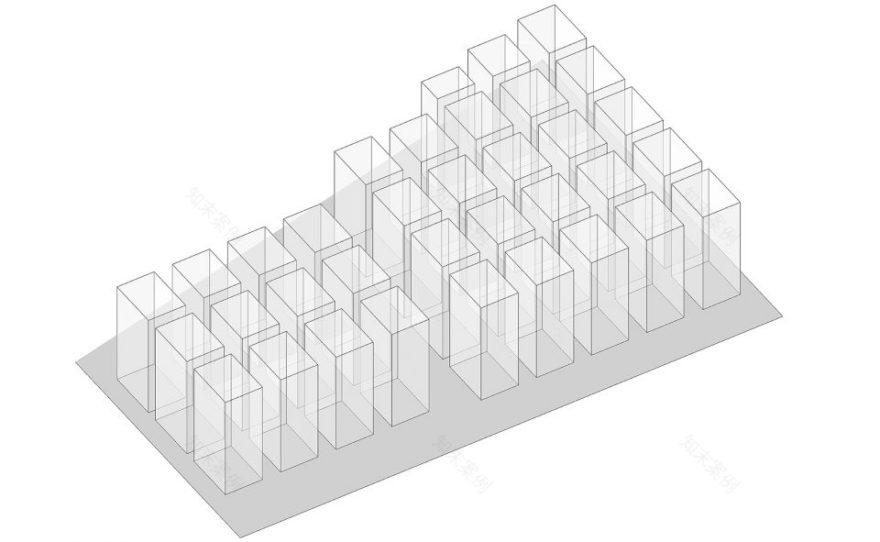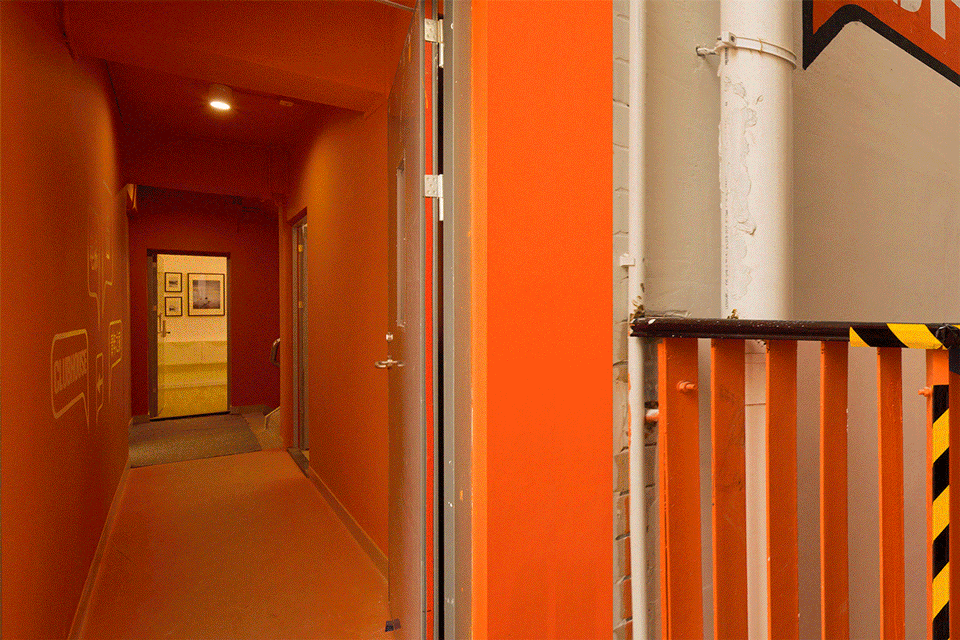查看完整案例


收藏

下载
DOFFICE于深圳设计了首个由城中村握手楼改造而成的人才保障房社区 – 深圳福田水围柠盟人才公寓。在没有任何先例和规范指引的情况下,经历了3年的探索、反复协调和修改,项目即将于近日落成。
DOFFICE has designed the first government-authorized affordable housing community for young professionals, converted by 35 “handshake building blocks” in a Shenzhen urban village, the Shuiwei LM Apartment. It has been an exploration journey of 3 years, and the community is eventually being completed recently.
▼深圳福田水围柠盟人才公寓鸟瞰,aerial view of LM Youth Community ©王晓勇
城中村 | Urban Village
80年代初的改革开放触发了深圳经济特区与本土村落的二元发展轨迹,村落很快被现代城市包围,形成 “城中村”。城中村为低收入人群和创业者提供了较低的城市门槛,为深圳城市化发展发挥了至关重要的作用;但其中的安全卫生和社会问题,也成为难以根治的诟病。过去10年间,城中村改造意味着大规模的拆迁,彻底推倒重建,成为千城一面的高级商住综合体。深圳城中村由80年代初的300多个,迅速消减到如今的200多个,正在逐步走向消失。
It is the Open Door Policy in the early 80’s that kicked off the parallel evolution of the indigenous villages and the SEZ of Shenzhen. As Shenzhen is going through an urbanization process from the 80’s and evolved into a metropolis of 12 million inhabitants as it is today, the rural indigenous villages that operate as different administrative entities, transformed itself into urbanized mini cities within its host.
▼水围村,Shuiwei Village ©DOFFICE
攀升的房价和生活成本导致大量产业人才的流失,人才保障性住房计划因应而生,但受土地资源以及旧区拆改难度的限制,城市中心区难以在短时间内为外来人口提供足够的廉价保障性住房,因此本项目成为了深圳市首个利用城中村“握手楼”改造为人才保障房社区的试点。项目改造后由政府反租补贴,低于市场价租与企业人才,补贴的金额相当于整治城中村的代价,形成一举多赢的局面。
对于您的问题,我已经按照要求处理了文本,如果有其他需要帮助的地方,请随时告诉我。
Shenzhen became a Special Economic Zone in 1979. This event triggered a massive influx of people from all over China to settle in this new city. But in the past decade, the cost of living has reached such a level, that many are leaving Shenzhen for their home town or other cities where the living condition is more affordable. In a bid to retain talents, Shenzhen created an affordable housing program to ease the housing pressure. Compared to other affordable housing developments, this project is a one of its kind. It is the first time the government leased property from the villagers, in this case an ensemble of 35 handshake tower blocks to be converted into affordable housing. In the past decade, urban renewal concerning urban villages often means mass demolition, a total eradication of any traces from the past, an abrupt replacement by brand new complexes with malls, offices and residential.
▼公寓外观,exterior view©王晓勇
规划策略 | Transformation Strategy
改造片区位于深圳中心区的水围村,规划面积约8000平方米,共35栋统建农民楼,其中的29栋改造为504间人才公寓。改造设计保持了原有的城市肌理、建筑结构及城中村特色的空间尺度;并通过提升消防、市政配套设施及电梯,成为符合现代标准的宜居空间。我们关注的,不仅是将农民房进行内部升级装修成为504间人才公寓,更在于如何将住在这504间公寓里的900名青年联系在一起,创建一个社区,而这个社区,又将会对水围村带来怎样的影响?
The site is located in Shuiwei Village, the city center of Shenzhen. The handshake tower block is a typical typology of the urban village. These mini residential towers of 9 by 12, with a height of 27 meters are densely clustered in a configuration where the distance between the towers are as small as 2.5 meters. To provide 500 plus rental units, the existing residential layout in the 35 “handshake housing blocks” has to be reconfigured and upgraded to meet the current living standards of the young urbanites.
▼规划策略,concept diagram
项目的35栋楼为村委股份公司统一规划,宅基地基本一致,楼宇间巷道宽2.5至4米,因而被喻为“握手楼”。楼宇的1至2层为商业、3层以上为住宅。如何组织这35栋长相一样的握手楼,如何组织传统商业街巷与公寓流线,如何避免迷宫般的布局,成为接手该项目的第一个问题。
我们通过等级划分,将巷道分为商业街和小横巷。并将所有住户入口归纳为9个庭院,形成商业及住户流线互不干扰的格局。
Another challenge, which we think is more interesting and significant, is how to turn this group of 35 towers with in total 504 apartment units and a population of 900 young professionals into a community instead of a sum of individual living units.
▼35栋握手楼,reconfigure existing units of 35 “handshake tower blocks” into 504 apartments
在楼缝中植入立体交通系统连接所有楼栋形成立体社区,Insertion of a 3 dimensional infrastructure system connecting the individual towers with communal spaces. This 3D network in-between creates a community, rather than treating the project as 35 individual towers
五层平面图 – 电梯连廊串联全部握手楼,fifth floor plan, the tower blocks are connected by the sky corridor and elevators
▼剖面图 – 立体的街区,section, a 3-dimensional neighbourhood
电梯院子 | Elevators and Courtyards
我们在握手楼之间局部的“一线天”巷道里,架设了7座电梯和钢结构连廊,每座电梯首层均设有电梯院子,成为公寓入口,因此社区并没有一个主入口,也不是封闭的社区,而是一个开放的社区,与村里的商街、古井遗迹、市集脉脉相连。
In-between the building gaps, we installed 7 elevators & many sky corridors connecting all the buildings. Each elevator has its entrance courtyard respectively, so there is no main entrance, and this is an open community.
▼电梯位置图,elevator diagram
▼握手楼部分“一线天”里加入了电梯和连廊,elevator & sky corridors in-between building blocks ©IVY Photography
空中连廊 | Sky Corridors
空中连廊和室内连廊相互串联,这个三维的交通流线系统连结了所有楼栋、屋顶花园、电梯庭院和青年之家,形成四通八达的网络,同时也成为居民休憩、交流的公共空间,并营造出立体的生活街区。
To create this community, our intervention is not so much happening inside the towers, but rather in-between. In these voids between the towers we created an infrastructural system with 7 elevators inter-connected by a lateral system of sky corridors on the 5th and the 7th floor. This 3 dimensional circulation system forms at the same time an important public space for the community, providing an extension of the limited living space to the individual units.
▼空中连廊位置图,sky corridor diagram
相对于常规新建的保障房,本项目是一个独特的存在,社区里35栋楼的业权是分散的,当中部分楼栋不参与改造,甚至还有零星的原居民家庭夹在人才公寓中。为避免流线系统变得盘根错节般复杂,我们采用了7种色彩代表了7部电梯、电梯院子及关联的楼栋和楼梯间,这些色彩也成为最简单明了的视觉引导系统,方便住户在迷宫般的街巷中认清方向。
The color coding divides this 3 dimensional infrastructure into service clusters to enhance the way finding within the labyrinth. During the design process the withdrawal from participation of a few landlords, owners of 6 towers and several units from different towers, gave a rhizomatic twist to this web of sky corridors.
▼握手楼“一线天”里新加的连廊和室内连廊形成四通八达的网络,sky corridors provide a convenient circulation system©DOFFICE
▼可作为公共活动空间的连廊,sky corridor as communal space ©IVY Photography
走廊内邻里相互问候,neighbours are greeting each other in the corridor ©DOFFICE
屋顶花园 | Roof Gardens
社区另一个标志性的公共空间是项目的第五立面,即屋顶花园。29个屋顶根据各自所在的色系形成色彩缤纷的屋顶空间,这些屋顶包含了洗衣房、菜园和休憩花园。
The roofscapes, the 5th façade of this project with its ultimate openness, add another dimension to the collection of public spaces to the project. The roofscapes are designed with the purpose to accommodate the programs as laundry rooms, vegetable gardens and lounges.
▼ 屋顶花园位置图 Roof Garden Diagram
▼开阔的屋顶公共空间,ultimate openness of the roofscape ©IVY Photography
▼城市屋顶农场,roof-farming©DOFFICE
▼屋顶洗衣房,roof laundry garden ©DOFFICE
▼屋顶休憩花园,roof lounge ©DOFFICE
青年之家 | Clubhouse
位于5层的青年之家是社区重要的公共空间之一。该空间通过钢结构连接两栋握手楼,以环状串联的形式布置了7种不同的功能,包括阅读室、茶室、多功能厅、社区厨房、社区餐厅、健身房及天井庭院。
Another important public space that supports this community is the communal space on the 5th floor. This is a 200 m2 Communal Living Room created by connecting 2 building blocks, equipped with gym, reading lounge, tea lounge, multipurpose gathering space and a communal kitchen with dining room.
▼青年之家位置图,clubhouse diagram
▼青年之家平面图Clubhouse
多功能活动厅,multi-purpose room ©王晓勇
▼社区厨房,communal kitchen ©王晓勇
户型改造 | Unit Typologies
握手楼虽长相类同,但却是由不同业主建设,因此每栋楼、甚至每层的户型都不同,通过设计简化及调整,竟可归纳出18种不同户型,面积由15-55平米不等,分为多种风格和布局,切合不同住户需求。
Based on the structural grid of the towers and the target of the client, there are 18 different unit typologies ranging from 15 to 55 m2.
▼18种户型平面,18 unit typologies
结语 | Re-Use versus Tabula Rasa
深圳的城中村,均有600年以上的历史,所以深圳并不是一个没有历史的城市。深圳的根在城中村,并承载着时代的集体记忆。我们希望通过改造措施,保留城市的肌理、文脉和集体记忆,为老村注入新的生命力、新的价值;并探讨通过旧建筑和新文化的结合,创造一个平台,引发新旧社区居民自身的参与与交融,活化老社区。同时,我们也希望通过本项目,思考城中村下一个时代使命,希望能给城中村“握手楼”一次再生的机会,“不推倒重来”的改造也是一个值得考虑的、严肃而有趣的选择。
Within the over-fanatic building market, urban villages are often seen as an eyesore within the generic glittering cityscape. Urban renewal plans with its strategy of creation by destruction have already swallowed up a great amount of villages. Urban villages are part of Shenzhen’s urbanization history and since late 80’s they evolved into an important ecosystem serving the migrant citizens of Shenzhen. It will be a win for the city to find alternative strategies for the urban villages, especially when the cityscape is already dominated by a small collection of “successful” typologies, like the shopping complexes, tech parks or gated communities, where the only difference is their facades.What makes this project so special is the opportunity to give the handshake tower blocks a second life and to create awareness that re-use of buildings is also a serious and interesting option to be considered.
▼公寓室内,unit interior ©DOFFICE
项目名称:深圳福田柠盟人才公寓
项目地址:中国-深圳市-福田区-水围村
竣工时间:2017年12月
项目开发:深业置地投资发展(深圳)有限公司
项目营运:深圳深业酒店管理有限公司
设计机构:DOFFICE创始点咨询(深圳)有限公司
合作机构:深圳市都市建筑设计有限公司
设计团队:Chris H.S.Lai, Jasmine M.Y.Tsoi, Kwan Yee Wong, Cindy Yan, David Wen, Demi Han, Zachary Bao, Jack Ou, Nita Lin, Red Liu, Ann Hu, Morning Dong, Ananda de Vos, Helene Pohl, Arnound Stavenuiter, Bert Oostdijk
摄影:IVY Photography & Production, Chris Lai, 王晓勇
PROJECT: Shenzhen Shuiwei LM Apartment
LOCATION: Shuiwei Village– Shenzhen – China
COMPLETION: 2017/12
CLIENT: Shum Yip Land Investment & Development Co., LTD
OPERATION: Shenzhen Shum Yip Hotels Management Co., LTD
ARCHITECT: DOFFICE Shenzhen Co., LTD
LDI: Shenzhen Urban Architectural Design Co., LTD
DESIGN TEAM: Chris Lai, Jasmine M.Y. Tsoi, Kwan Yee Wong, Cindy Yan, David Wen, Demi Han, Zachary Bao, Jack Ou, Nita Lin, Red Liu, Ann Hu, Morning Dong, Ananda de Vos, Helene Pohl, Arnound Stavenuiter, Bert Oostdijk
PHOTOGRAPHY: IVY Photography & Production, Chris Lai, Leo Xiao-yong Wang
客服
消息
收藏
下载
最近





























